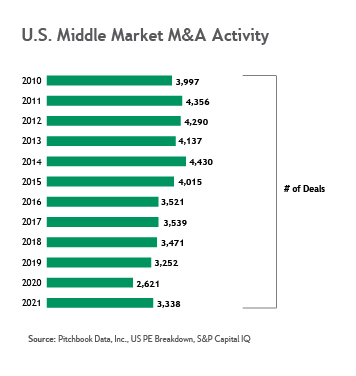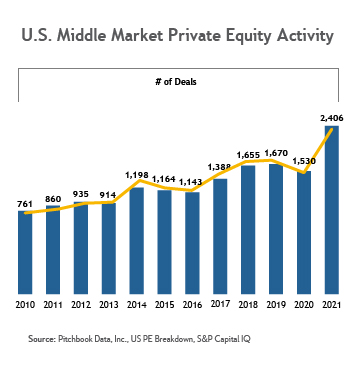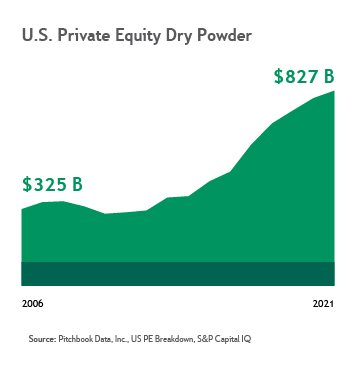
Sector Specialization on the Rise in Middle Market M&A as Private Equity Influence Grows
Jason Wallace | Head of M&A Advisory
Why this Matters
- The universe of potential buyers of middle market companies has grown as more private equity firms (PE firms) enter the market.
- As deal competition intensifies PE firms are focusing their efforts on specific market segments where they have experience and/or an investment thesis, which allows them to move more quickly and with conviction on potential deals.
- In this crowded competitive environment, the role of business development (BD) and coverage has become more clearly defined and more critical to PE firms and investment banks, respectively.
After a slowdown in 2020, there was a full sprint to complete M&A deals by the end of 2021, a surge that’s expected to continue through 2022. A primary driver of this deal flow in the middle market has been private equity firms, which are playing a bigger and bigger role as both buyers and sellers. PE shops are proliferating and continue to raise enormous amounts of capital that they must deploy, and they also need to exit their portfolio companies to generate returns for their investors. The universe of potential buyers for a traditional middle market deal has drastically expanded over the past five years.
In short, competition is intense, and with interest rates still low deal valuations are at record highs. It’s become a very fluid, crowded market. The number of middle market deals rose 27% from 2,621 in 2020 to 3,338 in 2021, according to Pitchbook Data. More remarkably is that about 72% of those deals were closed by PE as opposed to strategic buyers, and the number of PE deals has almost tripled in 10 years, from 860 to 2,406.

Build Relationships to See Deals
The vast majority of PE firms now have dedicated business development professionals and, similarly, nearly every investment bank has institutionalized the coverage of PE firms. These roles have become more defined over the past five years and more critical to keeping the market running efficiently.
More specifically, business development professionals at PE firms focus on creating and maintaining strong relationships with investment banks and key industry players to ensure their firm is seeing all the investment opportunities that fit its mandate and is well-positioned to win deals. Meanwhile, coverage professionals at investment banks focus on this relationship building to ensure their firms’ mandates get the appropriate attention from the decision makers at the likely buyers and they ultimately generate more business with their covered firms.
Specialize in Sectors to Win Deals
Another fundamental shift in the M&A market, which amplifies the importance of good business development, is the amount of sector specialization that has emerged over the past few years. Many PE firms have narrowed their focus to gain a competitive advantage. For example, while they are still broadly targeting business services deals, a PE firm today might hone in on soft facility services as their ideal investment opportunity, or instead of looking broadly at basic industrials, a firm might focus on industrial automation. Experts are more likely to win deals in their chosen sector because they can more quickly get up to speed on the opportunity and value that transaction with more conviction. PE firms increasingly believe that the sector intelligence derived from specialization enables them to generate additional value during their hold period.
As a result of this specialization and the emergence of institutionalized coverage and the business development function, the sell-side process has become more efficient. Some examples of this efficiency include:
- Buyers lists that are more targeted thanks to greater specialization
- Higher touch, senior banker-led processes are imperative to standout and garner attention from PE
- Earlier and expanded access to management during the marketing process
- More pre-emptive and third-party work completed by buyers and sellers to shorten diligence timelines
- Shorter exclusivity periods and fewer financing contingencies
Looking Forward
So, given these dynamics, what does the immediate future hold for middle market deal making? Interest rates are set to rise in 2022, inflation is at a 40-year high, and geopolitical issues are adding a troubling level of uncertainty. That would seem to lay the groundwork for a deal slowdown. Yet PE firms still have huge amounts of dry powder that they must deploy. By mid-2021, U.S. private equity had amassed $827 billion of unspent capital, according to Pitchbook, giving it significant fire power for fresh acquisitions. There is also an enormous inventory of PE portfolio companies that must be sold to satisfy investors. That will likely keep the deal spigot on.
We expect that deal volume in 2022 will be roughly on par with 2021, and that the rules of engagement that have emerged over the past five years will become more entrenched. To compete in this crowded, frenetic environment, companies need to specialize in sectors to zero in on the most enticing deals. With this expertise, companies can get up to speed on opportunities quickly, bid with conviction, and generate additional value during the hold period. Equally important to specialization will be building and maintaining relationships. Strong relationships will help ensure that the firm continues to see all the investment opportunities that fit its mandate and is always well-positioned to win deals.
Key Takeaways
- Competition for M&A deals will remain intense in 2022 and PE firms and investment banks need to differentiate themselves to win
- Established business development and coverage functions are critical for PE firms and banks to win in today’s market
- In a crowded, frenetic market, specialization is critical to moving fast and with conviction to win M&A deals
Jason Wallace is Head of Citizens M&A Advisory. He has extensive experience in advising middle-market companies in mergers and acquisitions as well as capital raising. Jason has led over 100 transactions in his career.
Related Reading

The public to private equity pivot continues
As the private capital ecosystem has expanded over the last 25 years, the private equity-backed company count has climbed, while the number of public companies has fallen sharply. Explore what these trends mean for midsized companies.

5 Steps to Succession Planning
By taking steps to evaluate your business and prepare it for a transition, you can maximize value and bolster the company's position.

4 Surprising M&A Trends
A Citizens survey of more than 400 U.S. businesses and private equity firms reveals notable trends in the M&A market.
Ready to take the next step? Get in touch with our team.
All fields are required unless marked as "Optional".
© Citizens Financial Group, Inc. All rights reserved. Citizens Bank, N.A. Member FDIC
“Citizens” is the marketing name for the business of Citizens Financial Group, Inc. (“CFG”) and its subsidiaries. “Citizens Capital Markets & Advisory” is the marketing name for the investment banking, research, sales, and trading activities of our institutional broker-dealer, Citizens JMP Securities, LLC (“CJMPS”), Member FINRA and SIPC (See FINRA BrokerCheck and SIPC.org). Securities products and services are offered to institutional clients through CJMPS. (CJMPS disclosures and CJMP Form CRS). Banking products and services are offered through Citizens Bank, N.A., Member FDIC. Citizens Valuation Services is a business division of Willamette Management Associates, Inc. (a wholly owned subsidiary of CFG).
Securities and investment products are subject to risk, including principal amount invested and are: NOT FDIC INSURED · NOT BANK GUARANTEED · MAY LOSE VALUE
